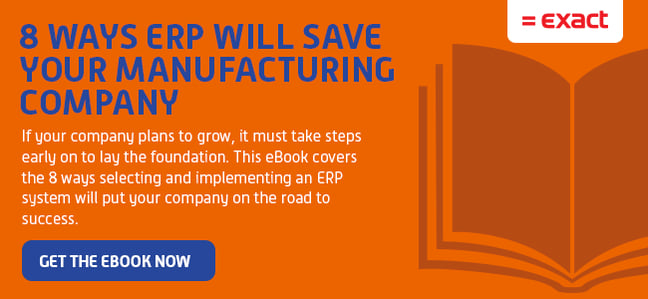 As your manufacturing business expands, you may begin to find that the same manual systems and processes that help you manage day-to-day operations start to bring about operational inefficiencies and frustrations. How do you know it’s time to ditch your manual system and begin thinking about implementing an ERP system?
As your manufacturing business expands, you may begin to find that the same manual systems and processes that help you manage day-to-day operations start to bring about operational inefficiencies and frustrations. How do you know it’s time to ditch your manual system and begin thinking about implementing an ERP system?
If it’s clear to you that your manual processes won’t scale as your business grows, ERP may be right for you. Here are some common business challenges that signal it may be time to seriously consider ERP.
1. Manual business processes are impacting growth.
Are you relying on spreadsheets and manual systems to run your manufacturing business? Relying on manual data input not only makes it more difficult to enforce common processes across an entire organization, but can also slow down or inhibit company growth altogether. That’s why important to make sure business processes have the ability to grow with you. With an ERP system in place, internal processes can be streamlined and managed appropriately and automatically, providing consistent and reliable information upon which to base important business decisions. With ERP you can set up systems that cultivate growth.
2. Every department is on a different page.
If each of your departments are storing important documents and spreadsheets in department-specific databases, there’s a chance that there is a disconnect in communication. When too many databases exist and each department is on it’s own page, things can get lost in the shuffle and inter-department communication can be put in jeopardy. Implementing an ERP solution can help create a fully integrated technology environment with one centralized database.
3. Reporting processes are unreliable.
Without an ERP system in place, you may find that business information is unreliable or out of date, or data is inconsistent across departments.
Implementing an ERP system will help streamline data across your entire organization, allowing you to collect and analyze data that can be used to build meaningful reports, and make sound business decisions based on this information.
4. Inaccurate material planning and inventory control leads to unhappy customers.
When there is minimal visibility into the material or product inventory needed to manufacture or fulfill orders, production and delivery delays can occur, resulting in unhappy customers. ERP can provide greater visibility into inventory levels and available-to-promise capabilities so teams can better manage opportunities and provide accurate delivery information from the start, saving you time and money and helping you deliver on your promises to customers.
There are a number of ways in which ERP can help improve manufacturing business operations. For more ways implementing a manufacturing ERP system can help align your business processes to grow a more successful company, download our eBook, 8 Ways ERP Will Save Your Manufacturing Company.






